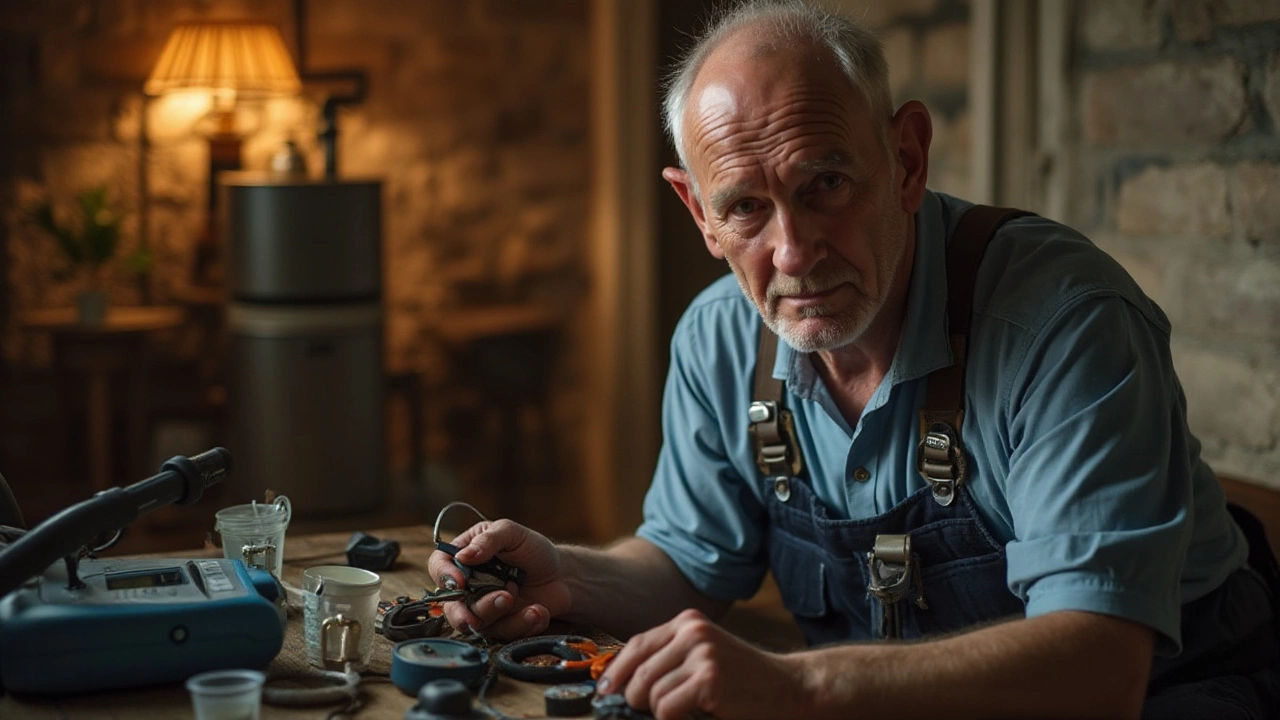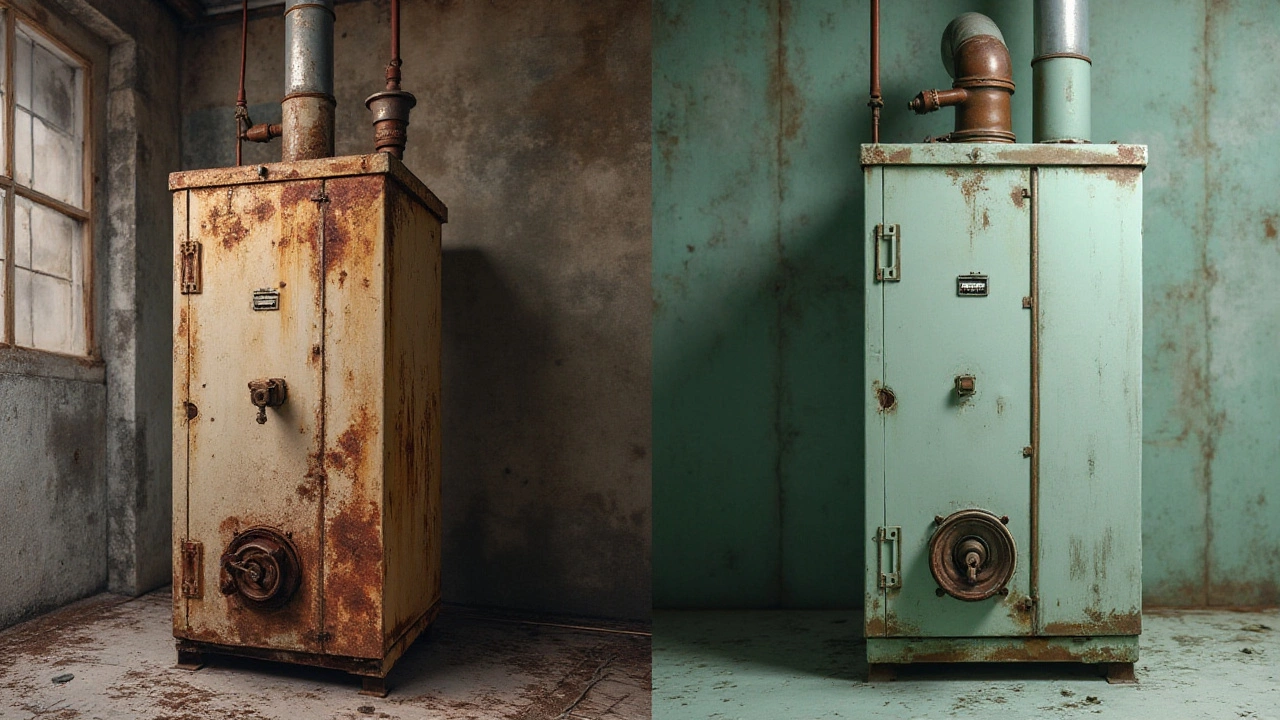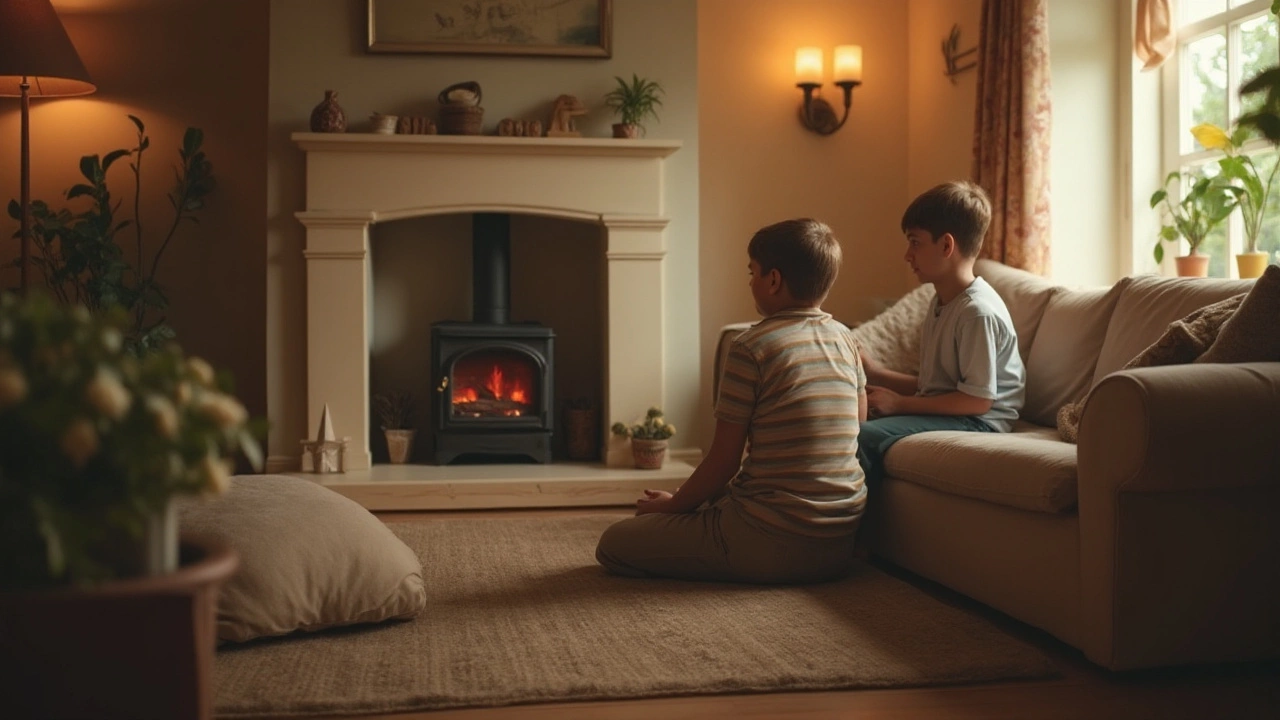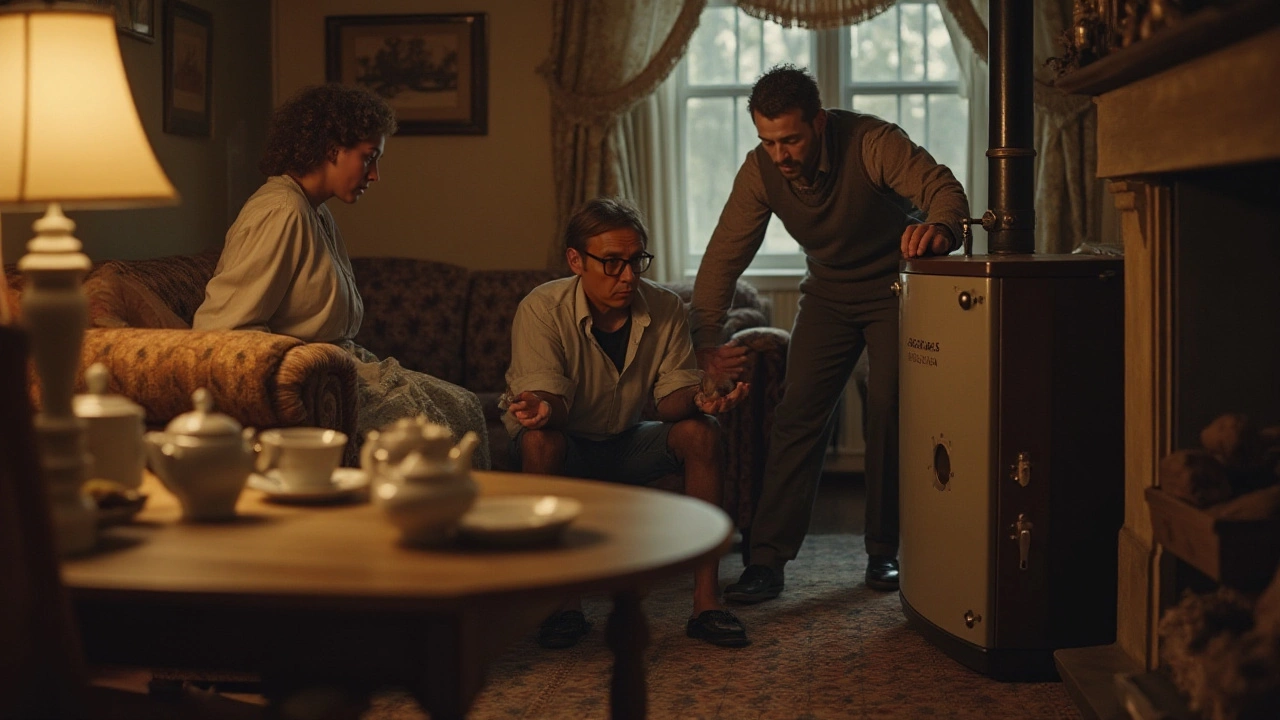
- 27 Oct 2024
- Gideon Thornton
- 0
Deciding on whether to repair or replace a 20-year-old boiler can feel like a monumental decision, like choosing between an old, reliable friend and the promise of new efficiency. If your boiler has been sitting gracefully in your basement for two decades, it's likely served its time with quiet dedication. Yet, every piece of machinery has its farewell tour.
In this article, we'll journey into the heart of this decision, exploring the intricacies involved. Think of it like weighing the merits of patching up an old car vs. investing in a new ride. Here, it's about more than just numbers. It's about understanding your home's heart—its heating system.
- Assessing the Boiler's Condition
- Understanding Repair Costs Versus Replacement
- Energy Efficiency Considerations
- Safety and Reliability Concerns
- Taking the Final Decision
Assessing the Boiler's Condition
Before diving headfirst into the decision of repairing or replacing your old boiler, it's crucial to get a clear picture of what you're dealing with. Just like you'd peek under the hood of a car before buying or selling, assessing the inner workings of your boiler is key. Start with a thorough visual inspection. Look for any obvious signs of wear and tear, such as rust, leaks, or dark soot. Aged boilers, like any venerable appliance, are prone to corrosion, which can signal it's time for either major repairs or a graceful retirement.
Another essential aspect in assessing the condition is performance. How efficiently has your boiler been warming your home? Take note if it's taking longer than usual to heat your space or if rooms have uneven temperatures. This might suggest it's huffing and puffing past its prime efficiency; boilers should ideally heat your home quickly and uniformly. Remember, even the best brands can't keep their efficiency forever. If you notice energy bills creeping skyward, it might indicate your unit is losing the battle age has set. And speaking of bills—those frequent repair calls are another hint that things might not be as rosy inside the boiler's framework. Each repair represents not just a cost in your wallet, but a hit to peace of mind.
Listening for Tell-Tale Sounds
Your boiler talks, albeit in its own metallic language. Sounds like banging or a persistent whir when it's running could potentially point to problems lurking beneath the surface. Such noises might be the result of wear on internal components, or something more sinister like a pressure issue. If you catch these sounds echoing through your basement, a professional should be dialing on speed dial. A skilled technician can help translate those grumbles into understandable repair estimates or, perhaps more dramatically, a replacement recommendation.
Assessing a boiler's condition isn't just a mechanical inspection but an emotional one too. After all, this is the device that has been your winter stalwart, the provider of warmth during those biting cold months. It’s worth listening not just to the racket it might make but also the advice of seasoned professionals. An expert can open your eyes to the true state of your boiler, cutting through the nostalgia with facts and figures. "A boiler's efficiency diminishes significantly after 15 years," notes energy expert John Smith, a veteran of the home heating industry. "By year 20, you'd better be sure that the continued investment in repairs is worth the dwindling returns."
Understanding Repair Costs Versus Replacement
When confronted with an aged boiler, the crucial query often boils down to the financial strain of **boiler repair** versus the substantial outlay for a new installation. This choice is not black and white, as it encompasses a multitude of factors beyond mere cost comparisons. Firstly, consider that a typical boiler lifespan hovers around 15 to 20 years. If yours is pushing that threshold, it's wise to scrutinize its performance history. Have repairs become a frequent occurrence? This is often an indicator of dwindling efficiency and increasing vulnerability to further breakdowns.
The repair cost isn't just about the immediate fix. Think of it as an iceberg, where the visible tip is the known expense, but lurking beneath are potential, unforeseen costs. Repairing a unit might temporarily solve a current issue but could lead to more significant malfunctions due to worn-out internal components that don't quite catch the eye during a regular service checkup. On the flip side, purchasing a new **boiler** might seem daunting, but it offers the peace of mind of reliability and increased energy efficiency, potentially leading to savings on your energy bills.
A good rule of thumb that many experts advise is the 50% rule. If the repair costs approach or exceed half the price of a new unit, it's time to consider the latter. However, beware—prices for a new boiler can vary dramatically based on the type and size, anywhere from $3,500 to $7,500 including installation costs. Those figures don’t account for the occasional modification needed for the existing infrastructure to accommodate newer models.
"Routine maintenance and minor repairs shouldn't be neglected; they extend life and preserve warranty terms for newer systems," suggests energy expert and author, Laura Boyes.
This can't be underestimated when weighing the scales. Of course, no decision is a simple math problem. Factors such as environmental impacts or potential incentives for energy-efficient home improvements can play pivotal roles. Government programs and energy companies sometimes offer rebates for upgrading to more efficient systems, which can ease the financial burden significantly.
Let’s not overlook the charm of brand new. The market today is ripe with models boasting not just efficiency but advanced features that allow seamless integration with smart home systems, providing remote access and improved customization options. This can enhance your comfort and convenience, all while reducing operating costs. When evaluating the best route, consider both the hard numbers and the soft benefits—comfort, environmental impact, modern convenience, and even aesthetic appeal. These factors contribute to turning an expenditure into a worthwhile investment.

Energy Efficiency Considerations
When thinking about your 20-year-old boiler, the phrase "energy efficiency" might spring to mind like a sudden lightbulb moment. In the depths of winter, your home heating costs can make your wallet feel a deep chill. The efficiency of your old boiler plays a significant role in this dance of dollars. A unit that’s seen two decades could easily guzzle more energy than its modern counterparts, just like gas-guzzling cars of yore compared to today’s sleek hybrids. Over the years, a decline is not uncommon, leading to higher bills and more frequent repairs as it attempts to keep up with demands it was once designed to meet with ease.
Let's delve deeper into these differences. Modern boilers boast efficiencies upwards of 90%, meaning almost all the energy goes towards heating your home and not lost to the ether. In contrast, your venerable 20-year-old boiler likely lingers around the 70-75% mark. This gap means a portion of the money you spend on gas or electricity is, quite literally, going up in smoke. It’s an expense that adds up over the months, accumulating to a hefty annual fee for less warmth, making your current system feel more like a financial burden than a functional heater. Such differences in efficiency could easily translate into hundreds of dollars saved annually with an updated unit.
There's also the consideration of each component inside your old boiler working overtime to compensate for any wear and inefficiencies. This extra strain potentially hastens the demise of other parts and ultimately contributes to rising repair costs. It's akin to an aging athlete playing in a game designed for the youth; although capable, they might falter at critical times when called upon to deliver at the highest standard. And as the world spins towards being more green-conscious, homes with older systems tend to carry a larger carbon footprint, inadvertently contributing to environmental concerns.
Technological advances are making newer systems smarter and more adaptable. Today’s boilers come packed with intelligent features, allowing them to adjust to changes in temperature and usage patterns with a flicker of intelligence similar to learning thermostats. They combat inefficiency head-on, offering modulating burners that adjust output to requirements seamlessly. These innovations not only improve energy efficiency but complement varied lifestyles, adapting to those unpredictable schedules life tends to throw our way.
In weighing these factors, Paula Glick, an expert from the Home Heating Association, remarked: "It’s not just about the immediate savings, it’s about the long-term value added to the home ecosystem." The choice becomes clearer when one reframes the question from 'can it be done?' to 'should it be done?'. Adopting a new energy-efficient system isn't simply a financial decision—it's a valuable step in upgrading the quality and functionality of your home environment.
Examining this data, the reality illuminates itself; investing in a new system is not merely about shaving a few bucks off your monthly bill. It's about a lasting solution that offers peace of mind in reliability, flexibility in technology, and a heartening nod to environmental responsibility, all encapsulated in your home’s heating brain. Whether to repair or replace becomes a question not solely about immediate cost but also about future savings, comfort, and global consciousness.
Safety and Reliability Concerns
When it comes to dealing with a 20-year-old boiler, safety is a very serious business. It's easy to forget the potential risks with a system that's quietly chugged along for years. Yet, these beasts have a way of letting their age show at very inconvenient times. Older boilers can develop issues that might not be immediately visible but can have critical safety implications. For instance, leaks around the unit can indicate a risk of carbon monoxide, a silent but very deadly gas. Over time, wear and tear can erode safety features built into the system.
Reliability is another big concern when talking about ancient boilers. It’s not just about the cold shower that greets you one freezing morning. It's about understanding that an old unit has parts that are just nearer to the end of their life. The malfunction of even a single component can halt the entire system, leaving you in the lurch. Old boilers can be unpredictable, with minor faults quickly snowballing into major breakdowns.
Let's face it, safety codes and standards evolve. What was considered safe two decades ago might not cut it today. The technology has improved significantly, with modern boilers equipped with better controls and safety devices. Before making any decision, consider how your system stands up to present-day safety norms. Do you know if your current boiler has safety controls in place to shut down in the event of a fault? It’s questions like these that should frame your thinking when deciding on these aged appliances.
An expert from the HVAC Association notes, "Keeping a boiler for over twenty years without updates is risky as it often bypasses the advances in technology designed to protect homeowners.”
On the reliability front, consider this: a breakdown might not just mean a repair bill, it could mean a full replacement is necessary, sometimes at the worst possible time. Imagine right in the heart of July with all the technicians booked. Parts for older models can be harder to find, making simple fixes labor-intensive and expensive. Sometimes, paying for constant repairs ends up costing more than investing in a new system upfront. It's vital to be truthful about whether a 20-year-old unit is resilient enough for your home’s heating needs.
To help you decide, let's touch some stats about efficiency and safety linked with boiler replacement. New boilers are touted to be 95% efficient in energy use compared to the possible 60% or lower efficiency in your older unit. An upgrade can lead to savings in your energy bills, not to mention peace of mind regarding safety concerns. In a world where energy consciousness is a growing priority, these numbers speak to a broader narrative where efficiency and safety intertwine.

Taking the Final Decision
When you stand at the crossroads of deciding whether to repair or replace your boiler, it helps to weigh all the critical angles up close. Your 20-year-old boiler may very well have been a stalwart guardian, providing warmth and comfort throughout countless chilly nights. Its metal heart might still beat, but age is a relentless beast, gradually conceding to modern efficiency and reliability standards. So, how do you decide? First, consider if frequent repairs have become a financial drain. If you’re repeatedly calling technicians, it’s time to do the math. Look at repair costs over the past year and anticipate upcoming expenses based on previous issues.
Factoring in Financials
When evaluating your boiler's future, juxtaposing the cost of potential repairs against a new unit can illuminate your path forward. Though repair services may seem cost-effective in the short term, a new boiler often comes with energy efficiency that slashes utility bills significantly. In terms of modern standards, new boilers can offer up to 95% energy efficiency, while older models might languish at 70% or less. What does this mean for you? Over time, the operational cost of an old boiler, quietly sipping more resources like an outdated family car craving gas, eventually surpasses the upfront cost of a replacement.
Regulatory Realities
Remember also that local regulations can impact your decision. As cities and states move to embrace cleaner energy standards, seeing old boilers phased out is not uncommon. It's worthwhile to check your local guidelines to steer clear of regulatory constraints and penalties.
"Modern heating solutions not only offer improved efficiency but also contribute significantly fewer emissions than their older counterparts," asserts energy expert John Pelton. This shift not only lightens the planet's load but may also align with environmental incentives—a neat pairing of civic duty and personal profit.
If eyes are trained upon the broader horizon, consider that your home’s value may notably increase with a modern system. Prospective buyers often appreciate energy-efficient utilities, viewing them as an economic windfall. A boiler that’s past its prime may turn off potential interest like a spoiler alert for a gripping novel.
The Sentimental Conclusion
At the end of the day, the decision walks hand in hand with your personal values and future plans. Is it time to uphold the familiar with continued repairs, embracing historical charm and character like an old family heirloom? Or does the lure of technological advancements and efficient innovation beckon a fresh start? Assess the need for reliability and comfort, and weave in the song of economic sensibility. Take stock of how long you intend to stay in your home and how much upfront cost works within your current financial constellation. If uncertainty still visits like an uninvited guest, reaching a trusted heating professional for guidance can illuminate the rarest of corners left in shadow.




